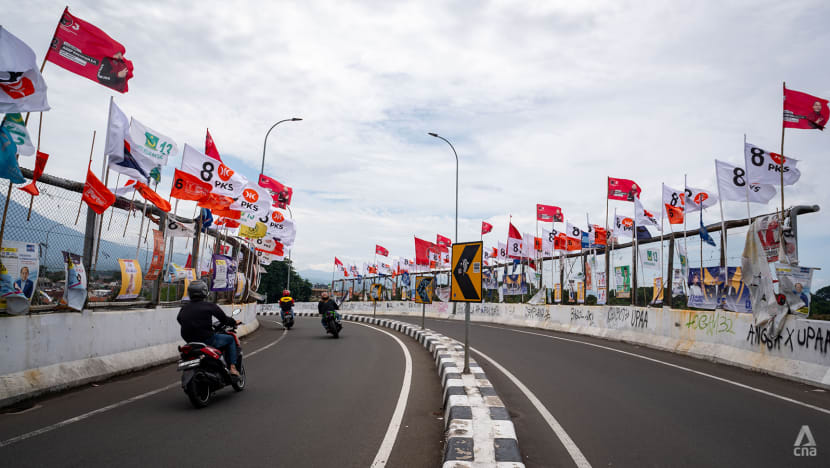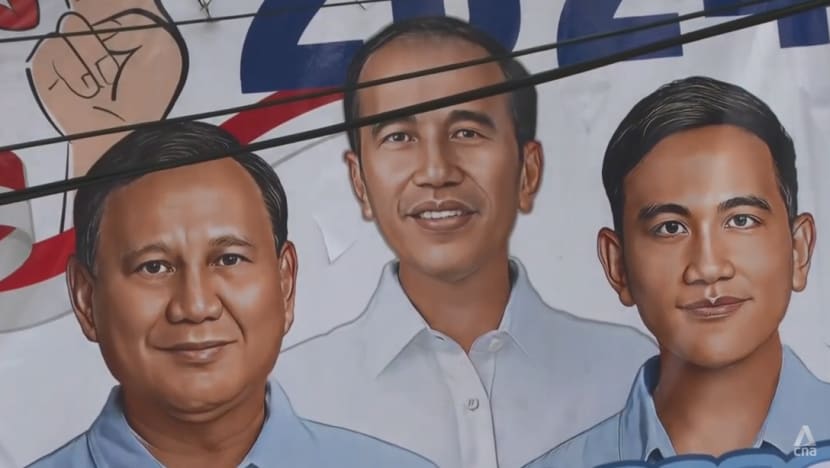Indonesia Elections 2024: Five issues that have hogged campaign headlines as Indonesians vote today
From unfair campaigning concerns to the importance of the Java vote, CNA sums up five issues that have shaped Indonesia’s presidential and legislative elections.

Flags of political parties participating in the 2024 Indonesia elections along the road. (Photo: CNA/Danang Wisanggeni)

This audio is generated by an AI tool.
SINGAPORE: Some 204.8 million eligible voters in Indonesia head to polling stations on Wednesday (Feb 14) to elect their next president, vice-president, senators and parliamentary members.
For the first time in 15 years, the world’s third-largest democracy is seeing a three-horse race for the presidency.
The candidates are defence minister Prabowo Subianto, 72, former Jakarta governor Anies Baswedan, 54, and former Central Java governor Ganjar Pranowo, 55. Outgoing president Joko Widodo is not allowed under the constitution to run for a third term.
Voting starts at 7am and closes at 1pm across three time zones, and quick-count results are expected a few hours after voting ends.
The latest surveys indicate Mr Prabowo could secure over 50 per cent of the vote and win the presidency in one round, without the need for a runoff on June 26 between the top two candidates. That said, his rivals remain very much in the contest.
At the same time, over 20,000 posts are up for grabs in the legislative elections and about 250,000 candidates have campaigned over 75 days between Nov 28 and Feb 10.
Who Indonesians pick to helm Southeast Asia’s largest economy will be closely watched in the region. CNA looks at five key issues that have shaped these elections.
.png?itok=icPRlxJi)
DYNASTIC POLITICS
Although not on the ballot, Mr Widodo has cast a long shadow over the 2024 elections.
His older son, Gibran Rakabuming Raka, is the vice-presidential running mate of Mr Prabowo.
Although Mr Gibran, 36, did not meet the law’s requirement for presidential and vice-presidential candidates to be at least 40 years old, Indonesia’s Constitutional Court – chaired by Mr Widodo's brother-in-law, then-chief justice Anwar Usman – made a ruling days before candidate registration opened.
It ruled that people who have been previously elected to regional posts may participate in the presidential election regardless of age. Mr Gibran is the mayor of Surakarta.
Academics and civil society groups have spoken up against the latest sign of dynastic politics and its potential harm to democracy. Aside from BJ Habibie, the country’s third president, every Indonesian president so far has had at least one immediate family member who entered politics.
But Mr Widodo's public approval ratings remain high.
Find out how events to strengthen his legacy have shaped the polls and the country's politics.
CNA Correspondent: How social media is shaping the Indonesia elections

CONFLICT OF INTEREST AND UNFAIR CAMPAIGNING?
The Prabowo-Gibran ticket also raised questions of conflict of interest and unfair campaigning.
During the campaign period, Mr Widodo leveraged his connections and position as president to gain support for the duo, such as through mobilisation of the military and police for Mr Prabowo, as well as his involvement in populist programmes to shore up support for the candidate many view as his choice successor.
This departed from the tradition of a non-running president remaining above politics during elections.
The line between Mr Prabowo’s positions as defence minister and presidential candidate also became increasingly blurred.
While Indonesia’s law changed in 2022, no longer requiring ministers or public officials of a similar rank to resign if they want to run for the presidency or vice-presidency, they still need to apply for leave days with President Widodo whenever they go campaigning.
Mr Prabowo’s schedule often saw him meeting campaign supporters in the morning, for example, before attending an event with other Cabinet members in the evening.
He was reported to the Elections Supervisory Committee (Bawaslu) on Jan 2 for distributing cash to his supporters in Cilincing, Jakarta. His legal team argued, however, that he was acting as defence minister, as part of the ministry’s programme to help the needy renovate their dilapidated houses.
Vice-presidential candidate Mr Mahfud MD was another minister who did not resign before standing for election as Mr Ganjar’s running mate.
But he promised to only campaign on Fridays, Saturdays and Sundays, spending the rest of the week on his duties as minister. This arrangement, he argued, made it easy for people to distinguish when he was acting as a public official and as a vice-presidential candidate. Mr Mahfud eventually resigned as coordinating minister for political, legal and security affairs on Feb 1.
Analysts have weighed in on whether Mr Widodo’s actions could affect public confidence in the presidency and the electoral process, as well as how blurred lines between various roles could risk state resources being abused for political gain.AI AND SOCIAL MEDIA
Real or fabricated? Bizarre videos of candidates – such as one of Mr Prabowo speaking fluent Arabic or another of Mr Anies being reprimanded by National Democratic Party (Nasdem) chairman Surya Paloh – have made the rounds on social media this election.
Artificial intelligence (AI) has aided the creation of such viral videos, and observers warn it could worsen disinformation in the country.
In a 2022 study conducted by Jakarta-based think tank, Centre for Strategic and International Studies (CSIS), 59 per cent of 1,200 respondents aged between 17 and 40 said that they get their information mainly from social media.
However, AI has also been a tool for candidates, their supporters, and even the election agency. They have used it to produce promotional materials, chatbots that make it seem like users are interacting with their chosen candidates, and to expedite the vote tallying process.
Read more about the benefits and dangers of AI in this election, as well as measures taken to manage disinformation exacerbated by social media.WINNING JAVA
Home to more than half of Indonesia’s eligible voters, the island of Java is pivotal in the elections.
Among its six provinces – Jakarta, Banten, West Java, Central Java, East Java and Yogyakarta – West Java has the highest number of voters (35.7 million) and is a stronghold of Mr Prabowo.
East Java, on the other hand, is seen as more of a swing province. This has prompted repeated and extensive visits by the three presidential candidates to win over its 31.4 million voters.
Former Central Java governor Ganjar is expected to win in his powerbase province and its neighbouring Yogyakarta, which has a combined total of about 31 million voters.
Former Jakarta governor Anies could win the hearts of Jakartans and people in neighbouring Banten, which make up 17 million voters.
Given the importance of the island, CNA delved into what candidates could do to boost their chances of victory.
THE NUSANTARA QUESTION
President Widodo’s ambitious plan to move Indonesia’s capital from the polluted and sinking metropolis of Jakarta to East Kalimantan, about 1,300km away, has garnered different responses from the presidential candidates.
Nusantara’s first phase – comprising a palace, a few ministries’ premises and basic infrastructure such as roads and housing – is scheduled to be ready by August 17 this year, on Indonesia’s independence day. The project is slated to be fully completed in 2045.
Mr Ganjar and Mr Prabowo have indicated they will continue Mr Widodo’s policies if they win.
Mr Anies, however, has said he will review the feasibility of Nusantara, noting that “there needs to be protection” so that foreign investors will not experience losses in the event the megaproject is not favourable to Indonesia.
Both Mr Prabowo and Mr Ganjar have also promised to continue the country’s drive to be a key player in the production of batteries for electric vehicles.
Indonesia holds the world’s largest nickel reserve with an estimated 21 million tonnes, and Mr Widodo has ramped up the mining and processing of nickel ore in the country, rather than exporting it in its raw form, with his downstreaming policy.
As with the relocation of the capital, however, downstreaming has caused environmental concerns.
Mr Anies, meanwhile, has promised to balance economic development and environmental protection and could review the policy.
The economic and social policies of Indonesia’s next president will be closely watched by investors and other countries.




















